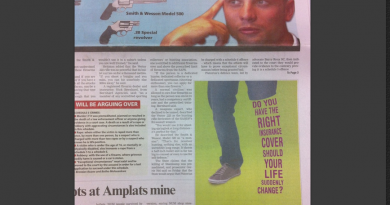Choc-filled April is Health Awareness Month – Seriously?
April is the month when South Africans hold their last sunshine-filled lunchtime braais, where long weekends force us all to wind down just a little and when many of us indulge in chocolates of all kinds – from boxfuls of ubiquitous marshmallow eggs, to all sorts of sweet treats. The month certainly ups the ante on the good life. SO who on earth decided that it should also be health month?
Actually, April might just be the ideal time to think a little more about your health. And the effects that overindulgence can have on that health. As winter approaches and it becomes ever harder to get up early to go to gym or to complete that early morning run, doesn’t it make sense to evaluate your state of health and think about how to make it a little better?
Because the simple truth is that overindulgence today can have severe repercussions tomorrow. How many of us realise that an extra glass of wine here and there or an Easter sugar binge can have dramatic longer term effects? How many of us realise that too many beers makes a difference to insurance premiums; that the prevalence of type 2 diabetes can be directly linked to increased sugar intake and can lead to insurance cover amendments, and that a crisp and biltong fetish could see heart conditions being excluded from life insurance policies?
“Life is perfectly imperfect and is most certainly for living, but there is no doubt that aspects of your lifestyle can cost you in the long run,” says Hayley Taylor, Head of Underwriting at Hollard Life. Pointing to the 155% increase in prevalence of Type 2 diabetes in the last 6 years in South Africa (according to the International Diabetes Federation), Taylor emphasises the fact that a healthier lifestyle can trim the cost of life and disability insurance cover, without requiring you to develop the physique and constitution of a modern-day Superman.
“What people don’t realise is that it’s not necessarily a life-changing event that leads to a health crisis,” explains Taylor. “Sometimes, gradual lifestyle changes and poor habits can lead to life-changing health conditions with long-term implications. While you should absolutely live your life to the fullest, it is important to keep your eyes open at the same time, maintaining a good level of health and wellness while it is still within your control.”
How do insurers deal with existing health conditions?
Of course, there are situations when you have less control over health conditions – conditions such as diabetes, hypertension, cancer, HIV, heart disease or even depression may all reach a stage where they can no longer be managed through lifestyle adjustments. While this may mean that your insurance is a little more complex or expensive than the average Joe, it fortunately shouldn’t stop you from getting cover at all. Through the use of two important insurance tools called ‘loadings’ and ‘exclusions’, an insurer can address even the most challenging health or lifestyle issues. But not without affecting your pocket.
A ‘loading’ is an additional cost applied to your premium when a life insurer believes that your state of health makes you statistically more likely to claim than the average person (such loadings may also be applied to recognise unusually dangerous hobbies or working environments).
In such cases, you may still get all the cover you require, but you will pay more for it. Here’s a practical example: Paul, aged 40, has a family history of high cholesterol and his father had a fatal heart attack before the age of 50. Paul’s routine medical tests also reveal that his cholesterol levels are much higher than the acceptable range for his age. Because of this, Paul has a much higher statistical risk of having a heart attack than the average person, so the insurer will apply a ‘loading’ on his premium. This loading would apply to the premiums for his life, critical illness and disability covers, since his condition makes him more likely to claim under all three of these types of cover. In this example, Paul’s insurer would still pay out for a valid heart attack claim, but he will pay more for his monthly premium.
An ‘exclusion’ is applied to your policy if an insurer determines that the risk of you making a claim related to a medical condition is too great (like loadings, exclusions can also be used for dangerous hobbies or risky occupations). In a case like this, an insurer would provide you with cover with no additional cost, but won’t pay a claim related to that specific condition, hobby or occupation. Exclusions can be permanent or for a specific period of time and insurers are required to inform you upfront of any such exclusion.
“You may not see it this way initially when faced with a loading or exclusion, but when you consider all of the potential reasons you might claim, it’s worth having a conversation with your financial advisor before you decide it’s not worth it. Choosing to be without ANY cover when it is available to you could put you and your family’s financial future at stake,” adds Taylor.
“It really is a matter of looking at life with your glass half full. Live life to the max, but manage your health, enjoy your wellness and make sure that your future is protected to the best extent possible. Sometimes counting the calories in those marshmallow eggs gives you an opportunity to enjoy the good times while getting the balance right.”




